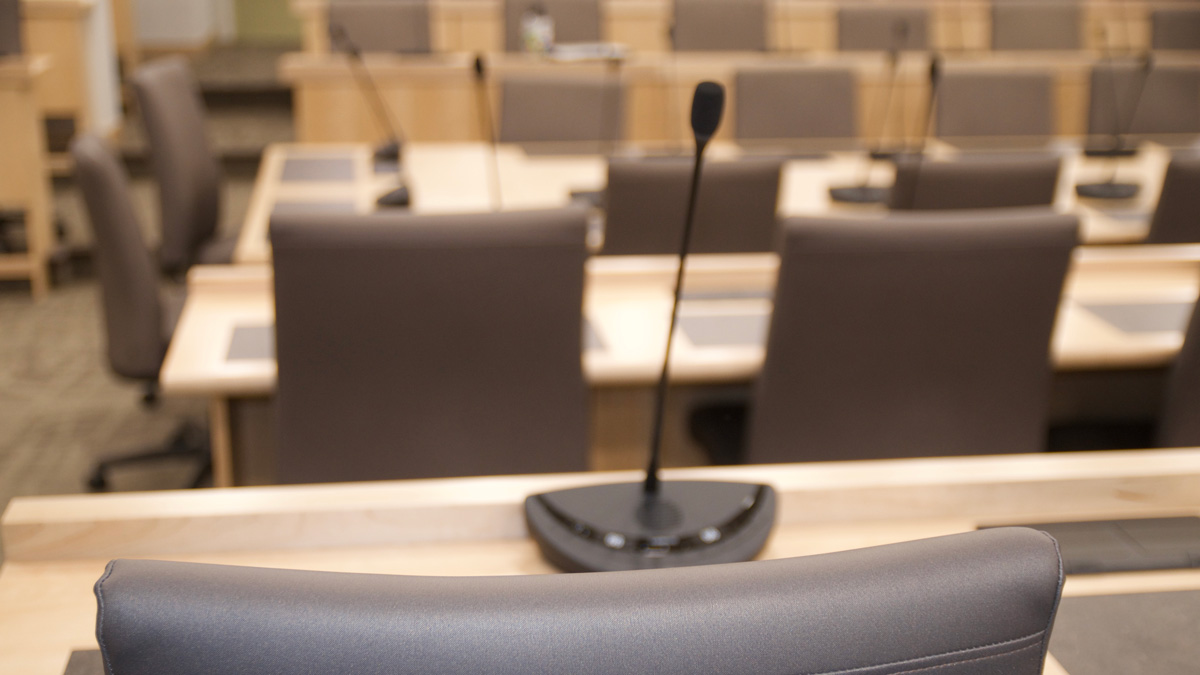Notes from Council: Executive goals updates, CAUS membership discussed
President Glock announces intention to plan a restructuring conference to revitalize CAUS, saying "I am only in CAUS for as long as CAUS serves the UASU."
 Sandra Fahl
Sandra Fahl“Notes from Council” is The Gateway’s ongoing series of recaps of noteworthy items from Students’ Council meetings.
At the January 7 meeting of the University of Alberta Students’ Union (UASU) Students’ Council, the executives presented updates on their 2024–25 executive goals.
Additionally, the motion to approve the 2025–26 UASU Students’ Council Composition Report was carried with 14 votes in favour. The distribution of seats on Students’ Council is determined by the size of faculties compared to total undergraduate enrolment. For 2025–26 the seats per faculty will not change.
Executive gives updates on 2024–25 goals
The executives provided updates on their 2024–25 goals, which were developed in alignment with the Student Experience Action Plan (SEAP). President Lisa Glock emphasized campus sustainability goals, sharing that the university will consult the UASU on their updated pesticide policy. Glock shared her goal to “revitalize” the Council of Alberta University Students (CAUS). She said that the organization needs to review its “mission, vision, and values” so it can “serve us better in the future.” The CAUS audit is complete, Glock added.
Vice-president (student life) Renson Alva reported that the Campus Food Bank (CFB) community consultation process has begun. The UASU is considering how the consultations can be used to inform a long-term strategy for the increased usage of the CFB, Alva said. He also announced that there will be a software replacing BearsDen.
Vice-president (academic) Layla Alhussainy shared that an elections task force survey was released on Perks. The elections task force will “continue its ongoing work,” she said.
Vice-president (external) Abdul Abbasi reported ongoing UASU advocacy for student affordability, internships for international students, and work-integrated learning opportunities.
Councillors question executives on executive goals
Business councillor Owen Pasay asked Glock about the progress on her goal of creating Indigenous green spaces on campus. Referring to the presentation that the Indigenous Students’ Union (ISU) gave to council on December 17, Pasay said that “supporting our Indigenous community seems more relevant than ever.”
Glock said that she did not receive much interest in the project from multiple stakeholders and is now considering making it a Campus Gardens project.
Agricultural, life, and environmental sciences (ALES) councillor Katie Tamsett asked Glock if there are plans to address concerns of campus safety, referring to the safety concerns expressed by the ISU.
Glock said that the UASU remains in communication with the Dean of Students (DoS) to “hold the university accountable.” The UASU is expanding SafeWalk and continuing to communicate with the ISU, Glock said. Glock is also aiming to create a “student leader round table” for students to speak directly to the Board of Governors (BoG).
CAUS membership discussed
Arts councillor Nathan Thiessen asked Glock about how CAUS is ensuring effective advocacy for the students it represents. Glock said that she believes that CAUS “has been struggling for a while now,” making a restructuring of the organization imperative. She cited “a decay of the organization and a lack of updates over the last few years” as reasons for restructuring.
Glock said she hopes to plan a restructuring conference to revitalize CAUS. The UASU will consider leaving the organization if — following the conference — CAUS “isn’t where it needs to be,” Glock said.
“I am only in CAUS for as long as CAUS serves the UASU,” Glock said. “I will do my best to save CAUS because I believe it is an institution that needs to exist.”
Issues with CAUS were previously raised at the April 16, 2024 meeting of Students’ Council. At this meeting 2023–24 Vice-president (external) Chris Beasley announced that CAUS had lost its status as a registered corporation. This was due to failing to register with the Alberta Corporate Registry before deadline twice.
In 2023–24 the UASU’s CAUS expenses totaled $67,371, according to Beasley. At this time, CAUS supplied approximately 45 per cent of CAUS’ budget. As a result, Beasley and 2023–24 UASU President Christ Fotang negotiated a hard cap of $60,000 for fee payment, dependent on if the CAUS Board resumed fee collection in 2024–25.
Science councillor Angelina Botros asked Glock how much the UASU will pay for its CAUS membership next year. Glock said that would be decided during the conference.
Additionally, Thiessen asked Glock if she would keep council informed on the UASU’s membership within CAUS. Glock replied that she would.




